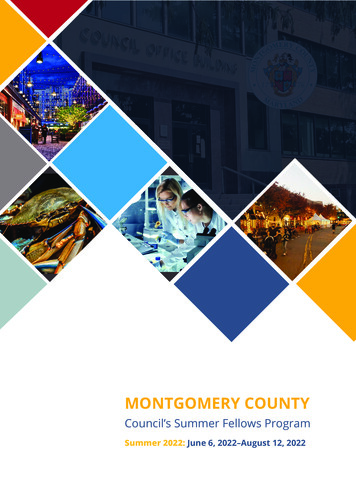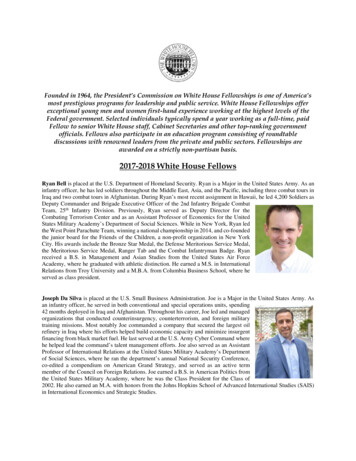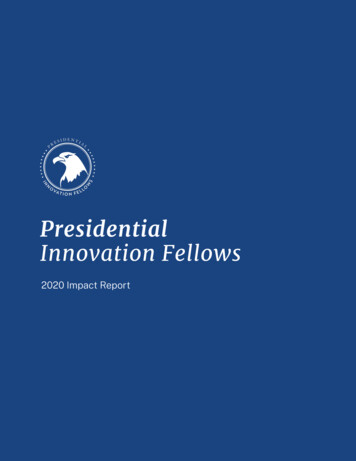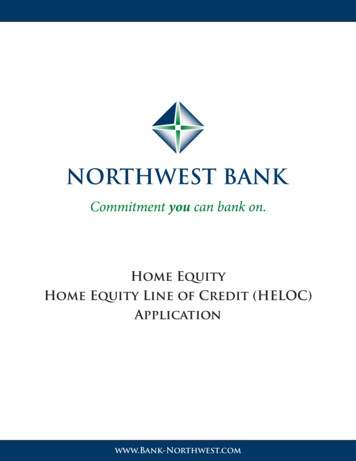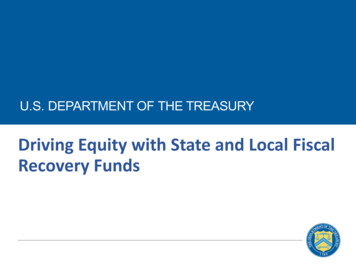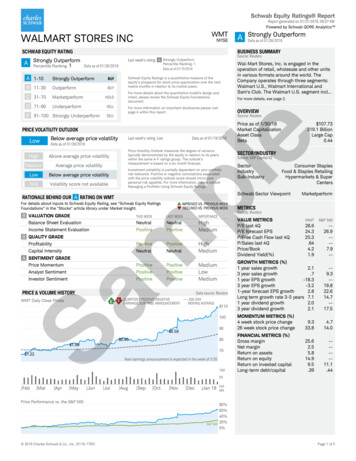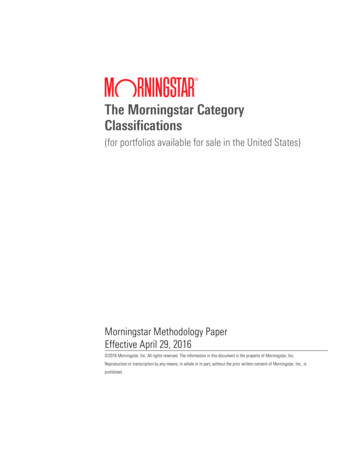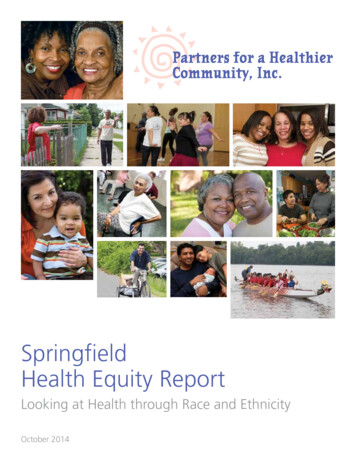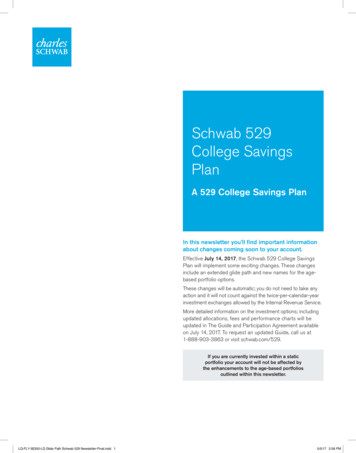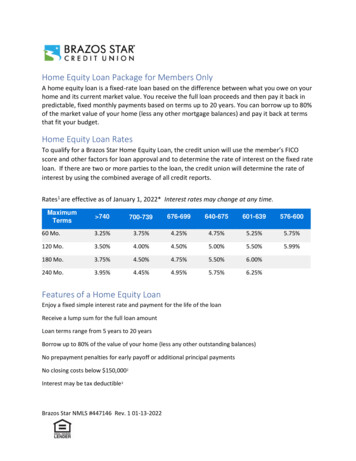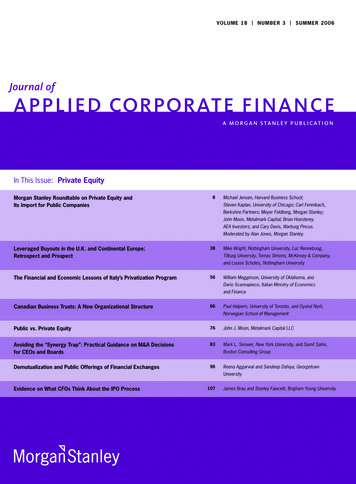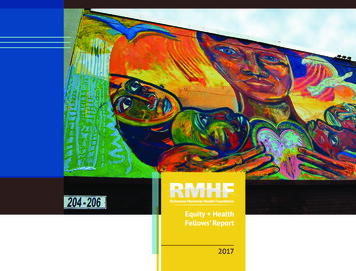
Transcription
Equity HealthFellows’ Report2017
I urge all of us to commit to addressing racism in our spheres ofinfluence. Whether it’s honestly taking stock of our implicit biases;exploring how we’ve internalized society’s negative assessments ofour race or culture; engaging in open, honest conversations; reflectingon the role White privilege plays in maintaining oppression; orassessing how our organizations unintentionally reproduce inequitableracial outcomes, there’s plenty of work for all of us. This workwill make us uncomfortable, but it begins by acknowledging andincreasing our understanding of racism.RMHF Equity HealthFellows’ ReportOctober 2017– E H Fellow Michael RoysterTowards an Equity Health AgendaRichmond Memorial Health Foundation4901 Libbie Mill East Boulevard, Suite 210Richmond VA 23220www.equityandhealth.orgTable of Contents1 Letter from the President& CEO and the Chair ofthe Board3 Fellows4 Who we areHow we workNow is the time5 What we found7 What we recommend8 Dismantling structuralracism9 Opening up decisionmaking power10 Addressing historicalpatterns of exclusion11 Improving the socialdeterminants of healththrough policy change12 What we will do nextWhat we hope13 Acknowledgments
Letter from thePresident & CEOand the Chair ofthe BoardLaunched in October 2016, the Equity Health Fellowship program emerged at a criticalmoment in Richmond Memorial Health Foundation’s (RMHF) history. For almost 18 monthspreceding the announcement of the Fellowship, the Trustees had been learning together aboutthe social determinants of health, the myriad roles that philanthropy can play in civil society, andthe need to address issues of equity as we live into our new mission of “fostering an equitableand healthy Richmond region.”RMHF’s Trustees identified the Equity Health Fellowship as a key step in putting their missioninto action. Trustees envisioned the Fellows as a group of strategic advisors from across theregion helping to map out RMHF’s equity agenda. Equally important, Trustees saw the Fellowshipas critical to laying the groundwork for RMHF to share ownership with the larger community aswe find new ways together to envision, implement and sustain equitable solutions to the region’smost pressing needs.The 18 men and women selected by external reviewers for the inaugural class of Equity HealthFellows exceeded expectations. They were not satisfied to just show up. They brought their fullselves to the work, investing many hours of their personal time outside of the formal gatherings.They are a remarkable force for genuine and necessary change within RMHF and across the region.In the pages that follow, the Fellows’ recommendations to RMHF are presented in their ownwords. Their vision is sharp-sighted and ambitious. Their action plan is propelled by a sense ofimmediacy. The Equity Health Fellows presented the recommendations to RMHF Trustees andstaff on October 17, 2017 – one year and four days after the call for applications was released.This document positions RMHF to move forward over the coming months and years. Trusteesand staff will study the Fellows’ recommendations, along with a parallel assessment of our equitywork, starting in November 2017 and extending through 2018. We intend to share our first-phasepriorities for learning, action and investment by March 2018. We understand that we must do ourown internal work so we are “walking the walk,” as well as “talking the talk.”In closing, we extend deep gratitude and respect to the 2017 Equity Health Fellows who amazedus by their courage, honesty, and commitment. They inspire and embolden us.Mark D. Constantine, PhDDanny TK Avula, MD, MPHPresident & CEOChair of the Board1
We are the 18 committed to change and the restoration of hope.We are the 18 with a commitment to Greater Richmond, our home.We bring our diverse talents and backgrounds to tackle the task at hand.To strategize to achieve health equity, and spread our learning across the land.The work is hard and the discussion uncomfortableBut we, the 18 are a group that is formidable.Among us there is neither pretense nor polite platitudesThere is only our honest presence with a positive attitude – E H Fellow Yvette Johnson-Threat2
FellowsRam Bhagat, Ed.D.Former Board Member/Facilitator/Trainer/Visionary,Richmond Peace EducationCenterAmy Howard, Ph.D.Assistant Vice President CommunityInitiatives, Bonner Center for CivicEngagement, University of RichmondPamela Parsons, Ph.D.Director of Practice and CommunityEngagement, Virginia CommonwealthUniversity School of NursingTracy CauseyChief Executive Officer, CapitalArea Health NetworkJoyce JacksonVice President of Community SocialWork, Better Housing CoalitionNelson ReveleyPresident, RVA Rapid Transit Board andPh.D. Candidate at UVa.Karen Faison, Ph.D.Professor and DepartmentChair, Virginia State UniversityDamon JiggettsExecutive Director, Peter PaulDevelopment CenterMichael Royster, M.D.Vice President, Institute for PublicHealth InnovationTanya GonzalezExecutive Director, SacredHeart Center, Inc.Yvette Johnson-Threat, M.D.Chief Medical Officer, Bon SecoursRichmond Health SystemMartha ShickleExecutive Director, Richmond RegionalPlanning District CommissionMargaret Nimmo HollandExecutive Director, Voices forVirginia’s ChildrenPatricia MillsDirector of Health Equity, RichmondCity Health DistrictAntonio Villa, M.D.Director, La Casa De La SaludSarah Bedard HollandExecutive Director, VirginiaOral Health CoalitionKendra NorrellGreen Team Manager, GroundworkRVAJonathan ZurPresident and CEO, Virginia Center forInclusive Communities3
Towards an Equity Health Agenda4Who We AreHow We WorkNow is the TimeWe are members of the Richmondcommunity who were drawn toRichmond Memorial Health Foundation(RMHF) Equity Health Fellowshipsbecause of our sense of urgency aboutthe inequities in our region, our passionto create more equitable conditions, andour desire to deepen our networks. Manyof us did not know each other before weassembled for the first session, and all ofus have strengthened our connectionsand deepened our learning. We havecome to understand and appreciate eachother’s values, differences, and gifts. Weshare a common aim: action. We desireto use what we know and what we havelearned together, to give RMHF a boldand actionable Equity Health Agenda.We recognize that RMHF is a relativelysmall foundation, but we believe it canhave an outsized impact on the region.Our Equity Health Agenda is designedto give the RMHF Board strategies to dothis crucial work.We spent five full-day sessionstogether over nine months, interpretinginformation, exploring new concepts forthe region, bringing our own experiencesto bear, deliberating tough issues, andformulating our Equity Health Agendafor RMHF. The national and regionalspeakers at each session informedour final recommendations, as did theliterature we reviewed. We present asynopsis of the most influential findingsbelow, followed by our recommendationsfor the RMHF Board’s Equity HealthAgenda for 2018–2020.Our recommendations speak to the future, yet the time to actis today. The health of our community is in peril, with children’slife chances and adults’ life expectancy cut short dependingon where they live and what they experience. There areneighborhoods in the Richmond region where the averageadult lives to age 65–69, and others where the average residentlives until age 86.2Our aim is to position RMHF to achievegreater health equity for the Richmondregion. We define health equity as theongoing process of cultivating everyone’sfull opportunity to live a healthy life,which reflects physical, social and mentalwell-being. We understand race equityas including communities of color andimmigrant and refugee communities.1While I have tried for many years to consider which voices are being heardin meetings, I now also find myself reflecting upon the very structure andagenda of the meetings, as well as factors like the location, room setup, andother details that can create experiences of inclusion or exclusion.– E H Fellow Jonathan ZurDuring the nine months of our deliberations, there weremultiple incidents of violence in local neighborhoods,particularly among young people. We work daily withcommunity residents who are unable to find or keep safe andaffordable housing, get to a job that pays enough to supporttheir family, or who live in fear of being deported due tochanging immigration laws and enforcement practices. Weknow that residential segregation and concentrated povertydid not happen overnight, and we will not resolve these issuesquickly.Yet the disproportionate gaps in life expectancy areunacceptable. We urge RMHF to move swiftly to help createa region where ZIP code, income and race do not determineone’s choices or health outcomes in life.
What We FoundThe historical harms of racist policies andpractices need to be addressed.Individual health and health equity isabout more than health care.Philanthropy is a vehicle forsocial change.Health inequities today have deep roots inracial disparities and discrimination (explicitas well as implicit) that stretch acrossgenerations. We believe it is imperative tochange historically discriminatory policies andpractices, and structures that privilege whitepeople over people of color. The patterns ofinstitutional racism in the Richmond regionare powerful drivers of exclusion to peopleof color. We learned about cities that haveestablished new ways of working together,resulting in more equitable distribution ofservices, increased fairness in hiring practices,more representative leadership and inclusivework environments.Only 20 percent of a person’s health can beattributed directly to the quality of and accessto health systems.3 Eighty percent dependson where a person lives and his or herability to earn a family-sustaining wage, findaffordable transportation options, and haveaccess to healthy food, education, places toexercise, safety from violence, and connectionto fellow neighbors. We define health broadlyto include quality and affordable health careand the social determinants of health, suchas safe and affordable housing, educationalopportunities, job and income security, accessto healthy foods, environmental quality,transportation, and lack of discrimination.Philanthropies like Richmond MemorialHealth Foundation have many tools tobring about social change. RMHF can useits resources to influence and changeregional policies and systems that createinequities; it can support direct services tomeet people’s needs and build communityassets. RMHF has the reputational capitalto convene citizens, conduct research, trainand advise individuals and organizations,foster collaboration, and sponsor educationalevents. RMHF has funds to invest locally, toissue loans or to advocate for policy change.As a small to midsized philanthropy, RMHFcan and should continue to use the full rangeof its tools to be a catalyst and champion forgreater health equity in the region.continued on the next page5
Authentic and lasting regional collaboration around health equity is rare.We realize that social change work often benefits from alliances and authenticcollaboration. RMHF is only one entity in a large region, and we represent 18 otherorganizations of varying sizes. Throughout our discussion, we saw the possibilities ofcollaborating to improve our community, and the potential for greater alignment in thephilanthropic and public sectors. We also noted that, in many cases, similar (and sometimescompeting) efforts can splinter funding, send conflicting messages to the public, and missopportunities for greater impact. We learned, for example, that the number of publicbodies with separate spheres of influence in the region often inhibits bold and inclusiveefforts and supports fragmented thinking. A belief behind our work is that connecting withothers to do large-scale change is valuable and makes one more likely to succeed thangoing it alone. With the Equity Health Agenda, we urge RMHF to seek collaboratingpartners who will support and accelerate shared work.6
What We RecommendOur vision is for a region where there is equitable and fair distribution ofresources and access to opportunities for health and well-being. We believeRichmond can become a place where race and income are no longer factorsin people’s health and well-being. While our recommendations are directed toRMHF, we envision a circle of influence in which the work of RMHF extendsbeyond the Foundation to its network of philanthropic and nonprofit partners,and, over time, to the Richmond region as a whole.We have four recommended goals to RMHF for its Equity Health Agenda.These are mutually supportive of each other and not in priority order. In thefollowing section, we outline the rationale for each of these, the connections toour learning, the outcomes we anticipate and the strategies to get there.GOALS:1. Model and support practices across sectors that explicitly promote racialequity and improve health outcomes.2. I nvest in the development and participation of traditionally underrepresentedcommunity members to be decision-makers and leaders in fostering equity.It’s easy to repeat the past, and to do whathas always been done, but we have no wish tocolor within the lines that’s easy. The guest3. B e a catalyst for greater racial equity and inclusion in nonprofit hiring andgovernance in the region.4. A dvocate for federal, state, regional, and local public policies that fosterhealth and equity in the region.speakers, diverse cohort, sharing of data andknowledge, give us the authority to go outsideof the lines. That means we can get messyand innovative while thinking beyond what hasalways been. Too often, people want to feelgood without actually doing good, but we wantto do good and leave an indelible footprintabout health equity with RMHF that canelevate the work done in our region.– E H Fellow Patricia Mills7
Dismantling Structural RacismModel and support practices across sectors that explicitly promote racial equity and improve health outcomes.1.1 Increase understanding of structural racism andways to dismantle these barriers1.1.1 Align and collaborate with communitypartners to address racial inequities1.2 Adopt and advocate for organizational practicesand structures that promote racial equity1.2.1 Lend credibility and visibility to supportracial equity among partners1.2.2 Create internal practices and proceduresat RMHF that eliminate racial inequitiesin operational practicesWe have a historically segregatedcommunity that is slow to change. As JohnMoeser noted, “we are more segregatedtoday than we were in the 18th and19th centuries.” Moeser describes how,beginning in the '60s, a combination of“public policy and practices in the privatesector” contributed to concentrated andsegregated poverty in the city of Richmondwhere “racial segregation morphed intosocioeconomic segregation.”4By 2020, 500 individuals will increase theirunderstanding of the links between structural racismand health equity through training and deliberationSocioeconomic segregation and persistentracism are drivers of poor health outcomesin the region. As Glenn Harris noted inhis presentation to RMHF, “From infantmortality to life expectancy, race predictshow well you will do in health, education,environment, housing, jobs, criminaljustice, arts and culture, and equitabledevelopment.”5 We urge RMHF to showhow racial inequities impact health outcomesthrough a visible and targeted effort. Weneed greater awareness about how ourpolicies, institutions, and leaders reinforcethese historic patterns, and how we can shiftpolicies, investments, and practices to turnthese patterns around.By 2020, at least five public or nonprofit organizationswill have adopted changed practices or policies thatlead to more equitable distribution of resources tocommunities of color in the region8We encourage RMHF to be a leadingadvocate in dismantling structural racismon a micro- and macro-level. RMHF caninvest its time and resources in supportingpractices that explicitly promote racialequity and improve health outcomes inpartnership with others in the community,resulting in changed behaviors, policies, andorganizational practices. This may includemaking investments and loans in low-wealthneighborhoods, advocating for the equitableallocation of public sector resources (suchas streetlights or contracts), or askinggrantee partners to set measureable goalsfor reducing racial disparities with thecommunities they serve.One way to change racial attitudes is tochange people’s behaviors through thestructures and institutions they encounterdaily. Courageous conversations witheach other can reduce racial biases, yetwe want our conversations to go further,be broader, and result in operationaland policy changes. To become a moreinclusive and just region, we need tochange the way our organizations andinstitutions operate. We encourageRMHF to be vocal, active, and strategic indedicating its efforts to creating a regionwhere, over time, race and ethnicity nolonger impact one’s ability to thrive.
Opening Up Decision-making PowerInvest in the development and participation of traditionally underrepresented communitymembers to be decision-makers and leaders in fostering equity.2.1 Advocate for and model the use of a racial equityframework for organizational and communitydecision-making in the region2.1.1 Facilitate and support full participationof grassroots leaders and membersof traditionally underrepresentedcommunities in organizationaldecision-making2.2 Develop and support a cohort of grassrootsleaders to promote health equity2.3 Invest in long-term change to advance healthequity and grassroots leadership through multiyear funding commitmentsBy 2020, RMHF will have trained and supported 75grassroots leaders who are serving in pivotal roles inthe community working for health equityBy 2020, RMHF and 50% of RMHF grantees use atransformative participatory decision-making processthat honors citizen input and empowers affectedcommunities to advance health equityAbbey Cofsky of Robert WoodJohnson Foundation speaksto E H Fellows.RMHF and its community partners willbenefit from disrupting traditional powerand decision-making structures to bemore inclusive of individuals who are mostdirectly affected by inequities. Changingthe patterns of how RMHF receives input,encourages participation and adoptsshared decision-making will require newapproaches. It will mean doing morelistening, and creating more welcomingenvironments for both residents andorganizational community partners. It willresult in supporting efforts that moredirectly address what matters most toresidents and communities. RMHF is in aunique position to place a high value onthe knowledge, engagement, and supportof traditionally underrepresented groupsand organizations in its own work and thatof its nonprofit and philanthropic partners.At the community level, resident andcommunity engagement can mean hiringcommunity members to survey or reachout to their own neighbors, or workingwith residents to lead neighborhoodprojects. At the policy level, it canmean creating structures that supportunderrepresented populations to bedecision-makers in changing regionalsystems and practices.6 To encouragegreater power-sharing in relationships,RMHF will need to model and supportnew modes of outreach by, for example,making meetings more accessible,developing nontraditional outreach effortsand leadership development opportunities,rethinking impact measures, and holdingevents in diverse community venues.7Community leadership development takestime, and a traditional one-year grantopportunity is rarely sufficient to buildtrust and bring about significant change.We encourage RMHF to consider longerterm investments to influence the powerdynamics and relationships of nonprofitorganizations as it invests in this area.We believe we could have been evenmore effective as strategic advisors hadour group of nonprofit leaders includedmore individuals directly affected byinequities. RMHF has respectfully ownedand acknowledged this shortcomingfrom the outset of the Equity HealthFellowship, but we see the value ofstructuring the Fellowship, and recruitingand selecting future Fellows in such a wayas to include the equal participation ofpeople whose lives are being cut short bysocial, racial, and health inequities.9
Addressing Historical Patterns of ExclusionBe a catalyst for greater racial equity and diversity in nonprofit hiringand governance in the region.3.1 Increase the participation and representationof diverse and unrepresented populations inboard and staff decisions and positions withinRichmond Memorial Health Foundation3.2 Promote and support greater racial inclusion inhiring and governance among RMHF communitypartner organizations3.2.1 Provide training and technical assistanceto support more equitable and inclusiveorganizationsBy 2020, 100% of RMHF grantees will haveparticipated in racial equity trainingBy 2020, 50% of grantees apply a racial equityframework to their organizations and changeinternal and external policies and governancepractices as a resultBy 2022, there will be a 30% increase in representationof people of color among RMHF and communitypartner grantee board members.10The Richmond region’s nonprofit andphilanthropic sectors remain relativelyhomogeneous, with few boards of directorsreflecting the ethnic and racial diversityof the region at large or representing theindividuals served by many social sectororganizations. Beyond the imperative tohave sector leadership reflect and engagethe population, Richmond organizationsare missing the opportunity to learn, grow,and innovate with their current leadership.More inclusive organizations have beenshown to be more effective, more attunedand responsive to community needs, andeven smarter—because it takes moremental power to understand and exploreanother’s perspectives on a regular basis.8Recent research suggests that the failureto hire people of color is not due to alack of opportunity or general trainingand education, but a bias in what searchcommittees are looking for in leadership.9A 2017 survey conducted by the BuildingMovement Project (BMP) found that hiringprocedures and biases affected the lack ofdiversity of many nonprofit leaders morethan a lack of training or a willingnessto lead on the part of applicants.10 Webelieve RMHF can serve as both anexample and a catalyst for more inclusiveand representative leadership in the socialsector, private sector, government, andcivic groups. RMHF can help change thenarrative about the barriers to supportingmore people of color in leadership roles.
Improving the Social Determinants of Health Through Policy ChangeAdvocate for federal, state, regional, and local public policies that foster health and equity in the region.4.1 Build capacity of the RMHF board, staff andcommunity partners to advocate for equitablepublic policies4.2 Develop a responsive and flexible process toidentify public priorities and strategies forRMHF support4.2.1 Use data, scan of the environment,and engagement of stakeholders todetermine need and potential value ofRMHF in areas of interest4.3 Be a leader in educating the regional communityon social determinants of health, their impactand the role of policyBy 2018, RMHF has an explicit policy to supportadvocacy, and is actively engaged in advocating and/orsupporting public policy changes by 2019By 2020, RMHF is explicitly supporting annually atleast three organizations and initiatives that advancepublic policies to foster health equityBy 2020, at least two public policies to advance healthequity at the state, federal, or regional level have beeninfluenced as a result of RMHF support as measured bynumbers of supporters, increased understanding, and/or change in policiesMany of the needs we identified in ourtime together cannot be addressed byservices or programs alone. For example,without significant improvements intransportation policies, it will remainchallenging to connect residents with jobsin the region. Without local governmentand state public policies that prioritizeequitable development, residents will bepriced out of changing neighborhoods.Without affordable publicly subsidizedmental health services, vulnerable childrenand families will remain at risk. We arestruck by the extent to which all of theseissues are interconnected and end upaffecting residents’ health, their ability tomeet their goals, and, ultimately, the lengthof their lives. So many of the conditions weface now are the result of historical policyand regulatory decisions.Changes in policy and regulations comeabout through activism, education, andleadership at all levels. Few philanthropiesin the region support nonprofits toengage in public policy work, yet itis essential to the kind of long-termchange we seek. We believe RMHFshould take on a larger advocacy andeducation role in the region, committo doing so in its policies, and educateits stakeholders about the value andappropriateness of advocacy as a methodof achieving health equity. As notedin Nonprofit Quarterly, “Fundamentally,advocacy is about speaking out andmaking a case for something important.”Advocacy can focus on individual clientsor a specific population or cause, andincludes research, public education, andcommunity organizing or mobilization.11Because policy topics change over time,we have not suggested the topics of publicpolicy for RMHF to address. Rather, werecommend RMHF develop a processto identify policy topics based on dataand the extent to which RMHF can bringunique value to the topic and can be aforce for positive change.11
What We Will Do NextWhat We HopeThese are ambitious goals, and we are poised to support RMHFin accomplishing them. With the Fellowship complete, we returnto our organizations as ambassadors and champions for the workwe ask RMHF to do. We want to stay involved; we will serve oncommittees, in conversations and out in the community withRMHF as it refines and implements the agenda. We intend togather again to determine other avenues to leverage the collectiveexpertise of the Fellows, and our commitment to the success ofRMHF and to an equitable Richmond region. At a minimum, weenvision gathering as a group each year to stay connected to eachother, to accelerate the work, take stock of progress and connectwith a growing network of people involved in fostering healthequity in the region. We are committed to achieving the Equity Health Agenda alongside you and expanding the power of our 18to the region.We are grateful for the opportunity to advise the RMHF Boardof Trustees. It is courageous for the Board to invite 18 new voicesinto the decision-making process. It is generous to share withus the benefit of the nation’s leading thinkers and activists, andto provide the space for substantive conversation and learning.We believe we have taken the best of what you have offered us,woven it together and distilled its essence with our recommendedEquity Health Agenda. We hope we have made a compellingcase to you for adopting the agenda over the next three years. Weare committed to our collective and individual role to do our partin advancing racial and health equity in the Richmond region.Footnotes121 Harris, Glenn. “Equity Makes Richmond Stronger: Building Stronger Communities andRacial Equality.” Lecture, Richmond Memorial Health Foundation, Richmond, VA, March 21,2017. https://www.youtube.com/watch?v Wbdo9RYcwLo.2 Woolf, Steven. 2017. “Life Expectancy at Birth Map, 2013-2017.” VCU Center for Society andHealth, Source: Health Opportunity Index, VDH Office of Minority Health and Health Equity3 Woolf, Steven. “Health Equity in the Richmond Region.” Lecture, Richmond MemorialHealth Foundation, Richmond, VA, January 25, 2017. https://www.youtube.com/watch?v 4ZOUwn5LifM.4 Moeser, John. 2015. “How We Got Here and Why it Matters.” Richmond Times Dispatch, June13, 2015. ers/article 498a5859-37aa-5457-8e50-8469a5afb5f8.html.5 Harris, Glenn. “Applying Racial Equity Tools.” Presentation, Center for Social Inclusion atRichmond Memorial Health Fund, March 19th, 2017.6 Equity Matters. 2013. “Six Essential Strategies for Inclusive Engagement.” Accessed October2, 2017. 4.7 Equity Matters. 2013. “Six Essential Strategies for Inclusive Engagement.” Accessed October2, 2017. 4. Seattle Office for CivilRights. 2009. “Inclusive Outreach and Public Engagement Guide” for the city of Seattle, WA.Accessed October 2, 2017. /GRE/IOPEguide01-11-12.pdf.8 Rock, David and Heidi Grant. 2016. “Why Diverse Teams are Smarter,” Harvard BusinessReview, November 4, 2016. ter.9 Suarez, Cyndi. 2017. “The Nonprofit Racial Leadership Gap: Flipping the Lens.” NonprofitQuarterly. June 8, 2017. t-racialleadership-gap-flipping-lens/.10 Breitfeld, Sean Thomas and Frances Kunreuther. 2017. Race to Lead: Confrontingthe Nonprofit Racial Leadership Gap. Building Movement Project. http://www.buildingmovement.org/pdf/RacetoLead NonprofitRacialLeadershipGap.pdf.11 “The Meaning and Actions of Advocacy.” Nonprofit Quarterly, September 21, -meaning-and-actions-of-advocacy/.
Fellowship Report AcknowledgmentsRichmond Memorial Health Foundation Trustees and staffoffer our heartfelt thanks to the following people whosesupport and guidance helped to make this Fellowship atransformative experience for the 18 Equity HealthFellows, as well as for RMHF.External reviewersKARL STAUBERchair of review panel, presi
Chief Medical Officer, Bon Secours Richmond Health System Patricia Mills Director of Health Equity, Richmond City Health District Kendra Norrell Green Team Manager, Groundwork RVA Pamela Parsons, Ph.D. Director of Practice and Community Engagement, Virginia Commonwealth University School of Nursing Nelson Reveley President, RVA Rapid Transit .
